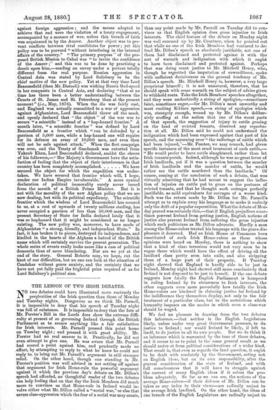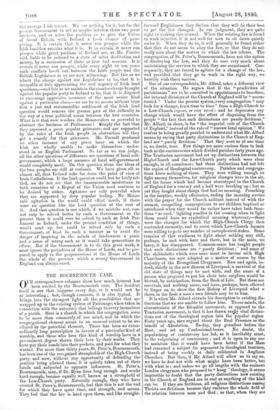THE LESSON OF TWO IRISH DEBATES.
NO two debates could have illustrated more curiously the perplexities of the Irish question than those of Monday and Tuesday nights. Dangerous as we think Mr. Parnell, it is impossible to deny that his speech of Tuesday night was full of substance. It is impossible to deny that the fate of Mr. Forster's Bill in the Lords does show the extreme diffi- culty at present of so governing Ireland through the British Parliament as to secure anything like a fair satisfaction for Irish interests. Mr. Parnell pressed this point home on Tuesday night ; and pressed it with great ability. Mr. Forster had no real answer to it. Practically, he did not even attempt to give one. He was aware that Mr. Parnell had scored a point against him, and prudently made no ,effort, by attempting to reply to what he knew he could not reply to, to bring out Mr. Parnell's argument in still stronger relief. On the other hand, though one standing in Mr. Forster's position was well advised in not setting off against that argument for Irish Home-rule the powerful argument against it which the previous day's debate on Mr. Dillon's speech had afforded, no thoughtful reader of the two debates can help feeling that on that day the Irish Members did much more to convince us that Home-rule in Ireland would in- volve either what Mr. Dillon called a "social war," or else that severe class-oppression "which the fear of a social war may create, than any point made by Mr. Parnell on Tuesday did to con- vince us that English opinion does gross injustice to Irish interests. The chief feature of the debate on Monday night was well summed up by Mr. Courtney, when he pointed out that while no one of the Irish Members had ventured to de- fend Mr. Dillon's speech as absolutely justifiable, not one of them had disclaimed and protested against it with the sort of warmth and indignation with which it ought to have been disclaimed and protested against. Perhaps that was doing scant justice to Mr. Mitchell Henry, who, though he regretted the imputation of cowardliness, spoke with sufficient decisiveness on the general tendency of Mr. Dillon's speech. Mr. Mitchell Henry is, however, a very large proprietor himself ; it is not unnatural, therefore, that he should speak with some warmth on the subject of advice given to withhold rents. Take the Irish Members' speeches altogether, and they were undoubtedly a string of apologies,—sometimes faint, sometimes eager,—for Mr. Dillon's most unworthy and most exciting Kildare speech,—a string of apologies which was, strangely enough, wound up by Mr. Dillon's deliber- ately scoffing at the notion that one of the worst parts of that speech, the suggestion of injury to cattle grazing on the land of evicted tenants, deserved any reproba- tion at all. Mr. Dillon said be could not understand the indignation which had been expressed against that part of his speech, and the mourning over "the sufferings of cattle which had been injured,"—Mr. Forster, we may remark, had given specific instances of the most cruel treatment of such cattle,— " He would prefer to have cattle slaughtered, rather than let Irish tenants perish. Indeed, although he was no great lover of Irish landlords, yet if it was a question between the murder of Irish landlords and the murder of cattle, he would rather see the cattle murdered than the landlords." Of course, coming at the conclusion of such a debate, that was virtually admitting that he had meant to suggest the inflic- tion of injuries on cattle pat to graze on the pastures of evicted tenants, and that he thought such outrages perfectly justifiable, as mild equivalents for outrages of a worse kind. Such was the return made by Mr. Dillon for Mr. Parnell's attempt so to explain away his language as to make it embody only the drift of a popular superstition. What the debate of Mon- day proved was certainly this,—that if English prejudices some- times prevent Ireland from getting justice, English notions of justice also prevent Ireland from suffering the gross injustice which such politicians as Mr. Dillon advocate. Hardly a man among the Home-rulers treated his language with the grave dis- pleasure it deserved. Had an Irish House of Commons been constituted of such Irish Home-rulers as those whose opinions were heard on Monday, there is nothing to show that a kind of class terrorism would not very soon be in vogue there which would have the effect of driving all the landlord class pretty soon into exile, and also stripping them of a large part of their property. If Tuesday night showed that England is hardly able to be just to Ireland, Monday night had showed still more conclusively that Ireland is not disposed to be just to herself. If the one debate suggests how fatally the English Parliament is hampered in ruling Ireland by its obtuseness to Irish interests, the other suggests even more powerfully how fatally the Irish Home-rulers are hindered in claiming justice for Ireland by the indifference they themselves display, not only to the fair treatment of a particular class, but to the restrictions which humanity imposes on the modes in which even a class-war should be waged.
We feel no pleasure in drawing from the two debates this inference,—that neither is the English Legislature likely, unless under very great Government pressure, to do justice to Ireland ; nor would Ireland be likely, if left to itself, to do justice to all its own people. But we do think it an inference which is warranted by the tone of these debates, and it seems to us to point to the same general result as we should arrive at from political considerations of a wider kind. That result is, that even as regards the land question, it ought to be dealt with resolutely by the Government, acting not on English ideas, but on its own responsibility, after the gravest consideration of the state of Ireland, and with full consciousness that it will have to struggle against the current of many English ideas if it solves the pro- blem adequately. So far as we can see, the notions of the average Home-rulers—if their defence of Mr. Dillon can be taken as any index to their views—are radically unjust to the average Irish landlord. On the other hand, the ideas of one branch of the English Legislature are radically unjust to the average Lih tenant. We see nothing for it, but for the present Government to act as umpire between these two great interests and so solve the problem as to give the Union of Great Britain with Ireland a fresh chance of pros- pering. It is certain that it never can prosper while the Irish land-law remains what it is. It is certain it never can prosper while great portions of Ireland are, as Mr. Forster said, liable to be reduced to a state of utter destitution and misery, by a succession of three or four bad seasons. It is certain it never can prosper, while every eight or ten years such conflicts break out between the Irish people and the British Legislature as we are now witnessing. But fair as we admit the charge against our Legislature to be, that it is incapable of duly appreciating the real urgency of Irish land questions,—and fair as we maintain the counter-charge brought against the popular party in Ireland to be, that it is disposed to encourage oppressive measures of the most severe kind against a particular class,—we are by no means without hope that a just and statesmanlike settlement of the Irish land question would remove the greater part of the difficulty in the way of a true political union between the two countries. What is it that now renders the Home-rulers so powerful to obstruct the business of Parliament ? simply the fact that they represent a great popular grievance, and are supported by the voice of the Irish people in obstruction till they get a remedy for that grievance. Mr. Parnell produced no other instance of any grave issue on which the Irish are wholly unable to make themselves under- stood in an English Parliament. So far as we can judge, all the other questions of difference are questions of local self- government, which a large measure of local self-government would completely meet. On this question alone the ideas of the two peoples am still at variance. We have given all, or almost all, that Ireland asks for from the point of view of Irish Catholicism. If the land question could but be fairly set- tled, we do not see that the immeasurable misfortune to both countries of a Repeal of the Union need continue to be desired by either. Agitators are only powerful when they are supported by deep popular feeling. No Home- rule agitation in the world could effect much, if there were no question like the land question at the root of it. And that question is one which, if we mistake not, can- not only be solved better by such a Government as the present than it could ever be solved by such an Irish Par- liament as Ireland, under the present condition of things, would send up, but could be solved on& by such a Government, at least in such a manner as to avoid the danger of inspiring in the minds of landowners a panic and a sense of wrong such as it would take generations to efface. But if the Government is to do this great work, it must ignore the prejudices of the House of Lords, and be pre- pared to apply to the prepossessions of the House of Lords the whole of the pressure which a strong Government in England can always exert.































 Previous page
Previous page